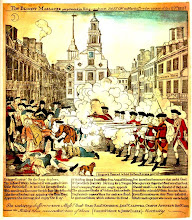In the 1760s the British Parliament placed new taxes on the colonies. The 1764 Sugar Act, the 1765 Stamp Act, put taxes and duties on imports such of sugar and tea. The 1767 Townshend Acts placed taxes on printed documents and publications.
Many colonists objected to these acts, claiming that only their elected assemblies had the right to tax them. Since colonies did not elect representative to the Parliament, these acts were seen as illegal, or as the colonists put it "no taxation without representation." The colonists resisteted by coycotting English goods until the acts were repealed. Americans also violently attacked tax collectors to prevent them from collecting taxes.
martes, 1 de junio de 2010
Suscribirse a:
Enviar comentarios (Atom)


No hay comentarios:
Publicar un comentario